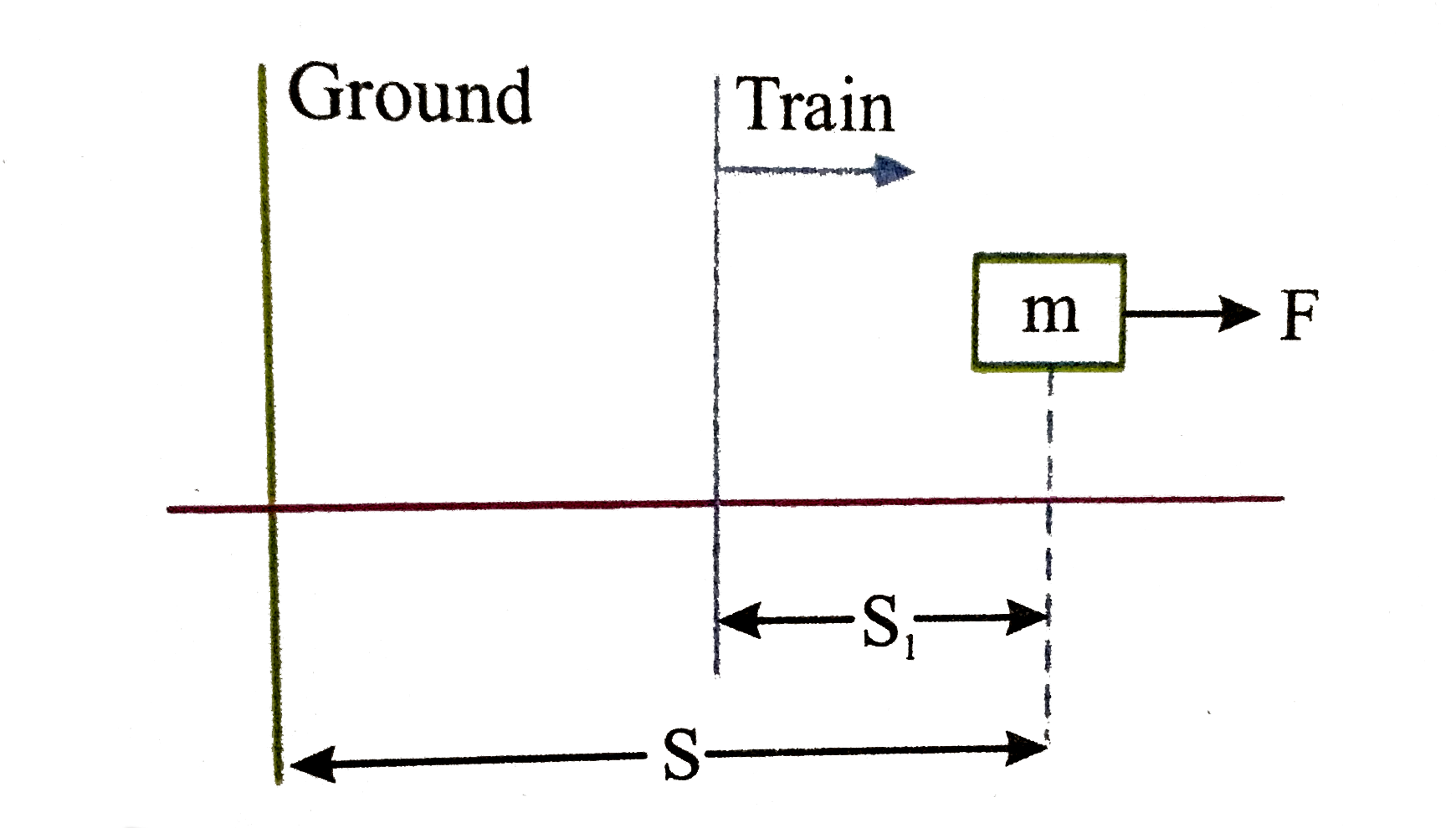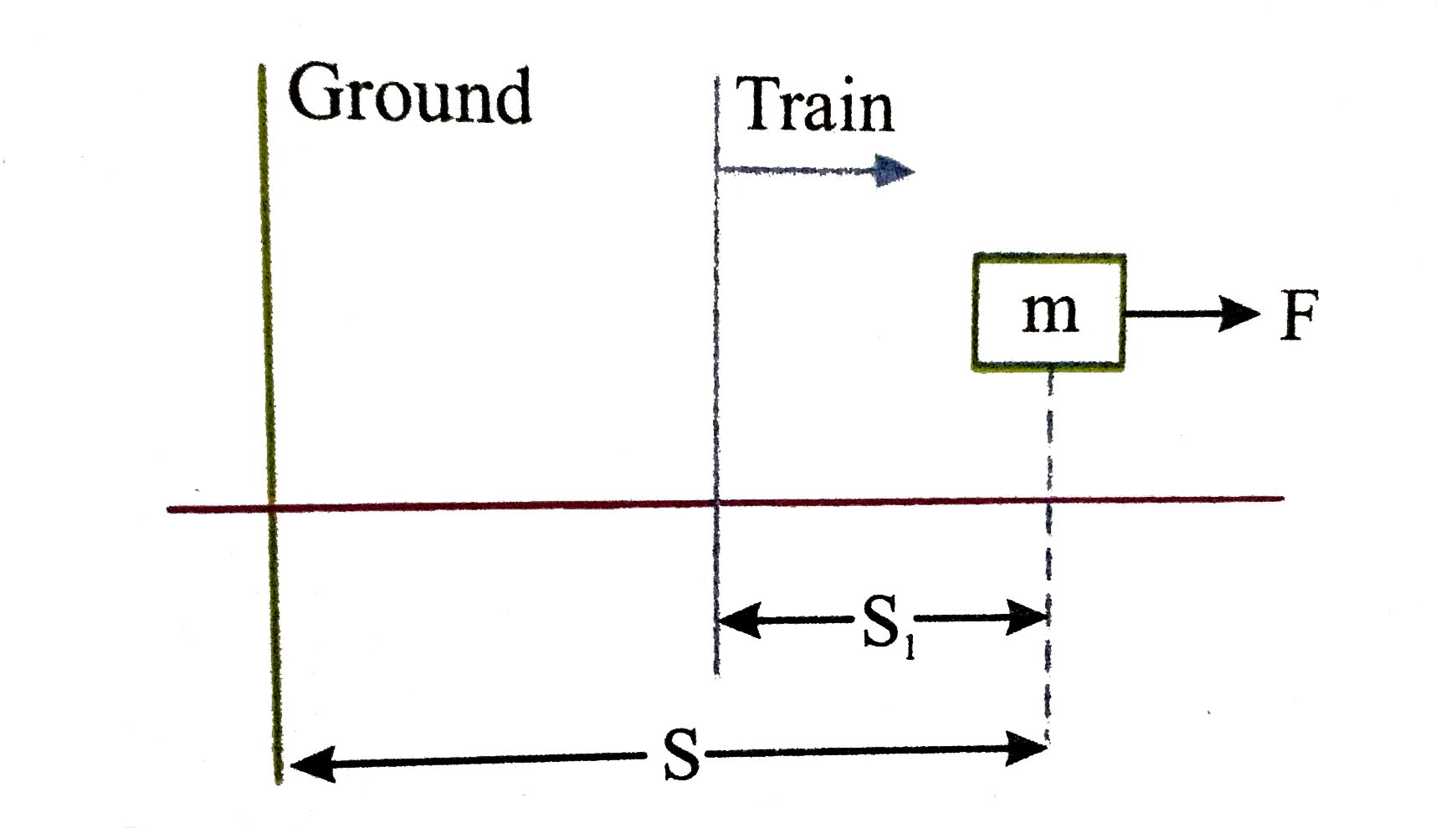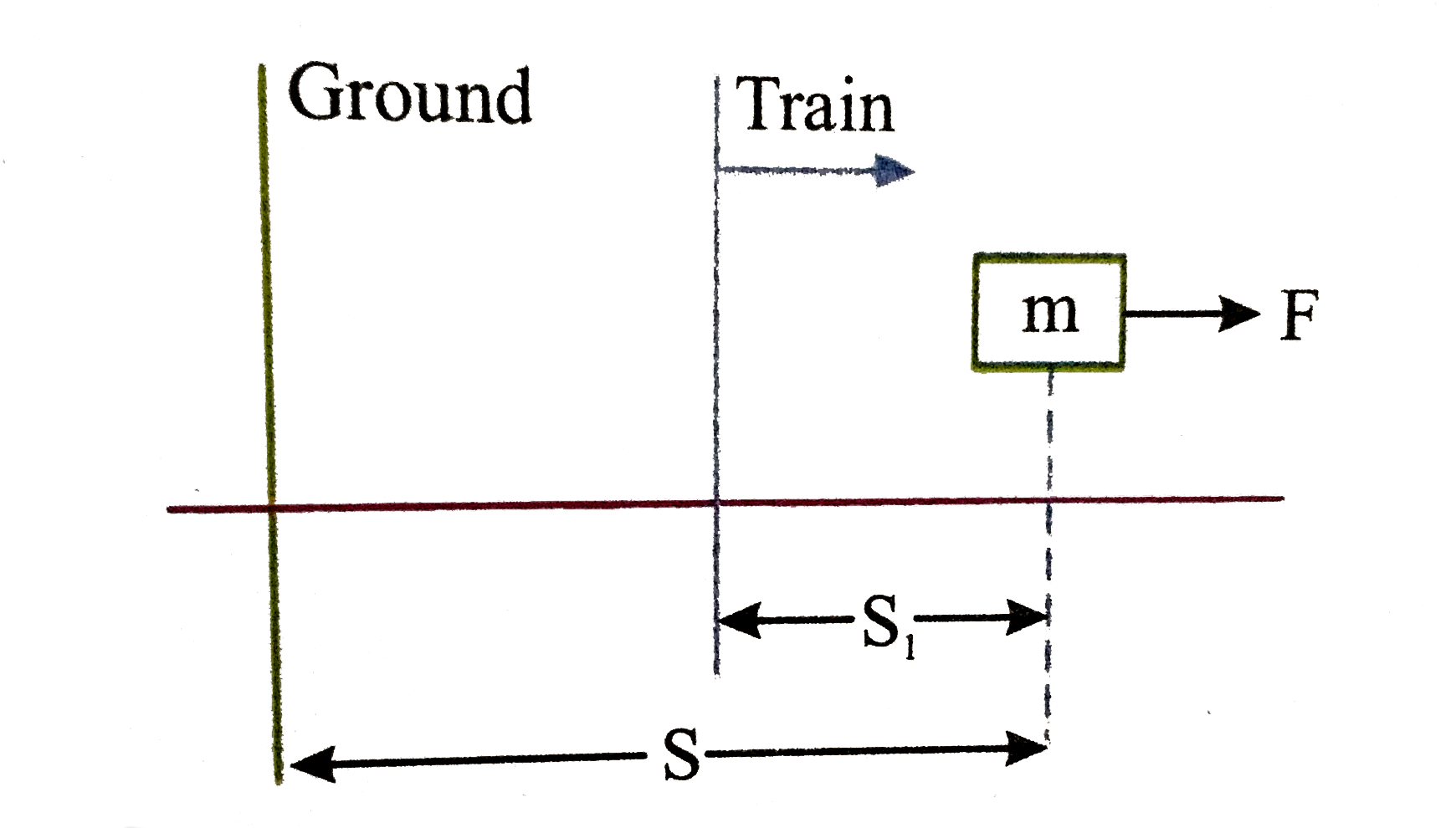A van is standing on a frictionless portion of a horizontal road. To start the engine, the vehicle must be set in motion in theforward direction. How can the persons sitting inside the van do it without coming out and pushing from behind?
Step by step video & image solution for A van is standing on a frictionless portion of a horizontal road. To start the engine, the vehicle must be set in motion in theforward direction. How can the persons sitting inside the van do it without coming out and pushing from behind? by Physics experts to help you in doubts & scoring excellent marks in Class 11 exams.
Updated on:21/07/2023Topper's Solved these Questions
- CENTRE OF MASS, LINEAR MOMENTUM, COLLISIONBOOK - HC VERMACHAPTER - CENTRE OF MASS, LINEAR MOMENTUM, COLLISIONEXERCISE - Objective 1
17 Videos
- CENTRE OF MASS, LINEAR MOMENTUM, COLLISIONBOOK - HC VERMACHAPTER - CENTRE OF MASS, LINEAR MOMENTUM, COLLISIONEXERCISE - Objective -1
1 Videos
- CENTRE OF MASS, LINEAR MOMENTUM, COLLISIONBOOK - HC VERMACHAPTER - CENTRE OF MASS, LINEAR MOMENTUM, COLLISIONEXERCISE - worked out Examples
23 Videos
- CALORIMETRYBOOK - HC VERMACHAPTER - CALORIMETRYEXERCISE - Exercises
18 Videos
- CIRCULAR MOTIONBOOK - HC VERMACHAPTER - CIRCULAR MOTIONEXERCISE - Exercises
30 Videos
Similar Questions
A plumb bob is hung from the ceiling of a train compartment. If the train moves with an acceleration a along a straight horizontal track, the stirng suporting the bob makes an angle tan1(ag) with the normkal to the ceiling. Suppose the train moves on an inclined straight track with uniform moves on aninclined straight track with uniform velocity. If the angle of incline is tan−1(ag), the string again makes the same angle with the normal to the ceiling. Can a person sitting inside the compartment tell by lookign at the plumb line whether the train is accelerated on a horizontal straight track or it is going on an incline? If yes, how? If no, suggest a method to do so.
View SolutionThere are five cities A, B, C, D, E on a certain island. Each city is connected to every other city by road. In how many ways can a person starting from city A come back to A after visiting some cities without visiting a city more than once and without taking same road more than once? (The order in which he visits the cities also matters: e.g. the routes A→B→C→A and A→C→B→A are different
View Solution
Knowledge Check
A block of mass m sits at rest on a frictionless table in a rail car that is moving with speed vc along a straight horizontal track (fig.) A person riding in the car pushes on the block with a net horizontal force F for a time t in the direction of the car's motion.

According to a person standing on the ground outside the train ?AVc+FtmBVc−2FtmCFtm−VcDzeroA block of mass m sits at rest on a frictionless table in a rail car that is moving with speed vc along a straight horizontal track (fig.) A person riding in the car pushes on the block with a net horizontal force F for a time t in the direction of the car's motion.

In terms of F,m & t, how far did the the force displace the object according to the person in car ?AFt2mBFt22mC2Ft2mD4Ft2mA block of mass m sits at rest on a frictionless table in a rail car that is moving with speed vc along a straight horizontal track (fig.) A person riding in the car pushes on the block with a net horizontal force F for a time t in the direction of the car's motion.

How much did K.E of the block change according to the person in the car ?AF2t22mBF2t2mC2F2t2mDNone of these
There are five cities A, B, C, D, E on a certain island. Each city is connected to every other city by road. In how many ways can a person starting from city A come back to A after visiting some cities without visiting a city more than once and without taking the same road more than once ? (The order in which he visits the cities also matters. e.g., the routes A→B→CAandA→C→B→A are different).
View SolutionRead the passages given below and answer the questions that follow them:
1. Actually, besides the God-given natural ability to think, two more things are necessary in order to think effectively. These are knowledge and organisation. The reason you can't think clearly about certain problems is that you do not have enough relevant knowledge or experience pertaining to them. If you have no knowledge of a subject, you have no starting point for your thoughts, or you will think from a wrong premise and, of course, think incorrectly. Since thought is the "go" sign for action, it seems likely that you will act incorrectly and do the wrong thing.
2. Obviously, the next thing to worry about is how to go about obtaining this relevant knowledge. Again, you must take the time to go out and search for it, if it pertains to some particular problem you must solve. Apart from definite and particular problems, your relevant knowledge can only be acquired through experience, from society in general, from listening to others and from reading.
3. Don't think because you converse with other people almost constantly, and read quite a bit, that you are necessarily acquiring all the knowledge you are exposed to. One important ingredient may be missing – that is, interest. You must have a spontaneous and genuine interest and/or curiosity about a subject in order to gain much knowledge about it. One good way, incidentally, of being interested in others is to stop thinking of yourself so much. Listen a little more than you talk and you may learn something. Another way of acquiring knowledge is to read with your mind instead of only with your eyes.
4. The salesman who wants to have a ready answer for any argument must know his product inside out. He makes it his business to learn all he can about it. The executive who has a reputation for always coming up with good practical ideas at the conference table may appear to be pulling these ideas out of the air, but nothing could be further from the truth. He has probably spent a good deal of time studying all the problems that may come up. He is not the type who shuts off his thinking ability the moment he leaves his office. He does research into his business, he is genuinely interested in it.
5. There you have some work cut out for you. If you want to think clearly and effectively about your own line of endeavour (or anything else), learn all you can about it!
On the basis of your reading of the passage, answer the question
What are the two more things necessary for thinking effectively besides the God-given ability to think?
View SolutionRead the passages given below and answer the questions that follow them:
1. Actually, besides the God-given natural ability to think, two more things are necessary in order to think effectively. These are knowledge and organisation. The reason you can't think clearly about certain problems is that you do not have enough relevant knowledge or experience pertaining to them. If you have no knowledge of a subject, you have no starting point for your thoughts, or you will think from a wrong premise and, of course, think incorrectly. Since thought is the "go" sign for action, it seems likely that you will act incorrectly and do the wrong thing.
2. Obviously, the next thing to worry about is how to go about obtaining this relevant knowledge. Again, you must take the time to go out and search for it, if it pertains to some particular problem you must solve. Apart from definite and particular problems, your relevant knowledge can only be acquired through experience, from society in general, from listening to others and from reading.
3. Don't think because you converse with other people almost constantly, and read quite a bit, that you are necessarily acquiring all the knowledge you are exposed to. One important ingredient may be missing – that is, interest. You must have a spontaneous and genuine interest and/or curiosity about a subject in order to gain much knowledge about it. One good way, incidentally, of being interested in others is to stop thinking of yourself so much. Listen a little more than you talk and you may learn something. Another way of acquiring knowledge is to read with your mind instead of only with your eyes.
4. The salesman who wants to have a ready answer for any argument must know his product inside out. He makes it his business to learn all he can about it. The executive who has a reputation for always coming up with good practical ideas at the conference table may appear to be pulling these ideas out of the air, but nothing could be further from the truth. He has probably spent a good deal of time studying all the problems that may come up. He is not the type who shuts off his thinking ability the moment he leaves his office. He does research into his business, he is genuinely interested in it.
5. There you have some work cut out for you. If you want to think clearly and effectively about your own line of endeavour (or anything else), learn all you can about it!
On the basis of your reading of the passage, answer the question
In para 3, the synonym of 'happening naturally' is___
View SolutionHelicopters are very different from airplanes. They can do three things that airplanes cannot do. First, when airplanes move upward, they must also move forward, but helicopters can move straight up without moving ahead. Second, helicopters can fly backward, which airplanes cannot do. Third, helicopters can use their rotors to hover in the air, which is impossible for airplanes. Helicopters can perform actions that airplanes cannot, they are used for different tasks. Since, helicopters can take off without moving forward, they do not need a runway for take off. They are used in congested areas where there is no room for airplanes or in isolated areas, which do not have airports. Because they can hover, they are used on firefighting missions to drop water on fires. They are used in logging operations to lift trees out of forests. Helicopters are used as air ambulances to airlift patients out of situations, which are difficult to reach by conventional ambulances. The police used helicopters to follow suspects on the ground or to search for cars on the ground. Of course, helicopters have military uses because of their design and capabilities.
Select from the four options, the correct reported speech of the following direct speech : She asked me, "how much did you pay for this bag?"
View SolutionRead the passages given below and answer the questions that follow them:
1. Actually, besides the God-given natural ability to think, two more things are necessary in order to think effectively. These are knowledge and organisation. The reason you can't think clearly about certain problems is that you do not have enough relevant knowledge or experience pertaining to them. If you have no knowledge of a subject, you have no starting point for your thoughts, or you will think from a wrong premise and, of course, think incorrectly. Since thought is the "go" sign for action, it seems likely that you will act incorrectly and do the wrong thing.
2. Obviously, the next thing to worry about is how to go about obtaining this relevant knowledge. Again, you must take the time to go out and search for it, if it pertains to some particular problem you must solve. Apart from definite and particular problems, your relevant knowledge can only be acquired through experience, from society in general, from listening to others and from reading.
3. Don't think because you converse with other people almost constantly, and read quite a bit, that you are necessarily acquiring all the knowledge you are exposed to. One important ingredient may be missing – that is, interest. You must have a spontaneous and genuine interest and/or curiosity about a subject in order to gain much knowledge about it. One good way, incidentally, of being interested in others is to stop thinking of yourself so much. Listen a little more than you talk and you may learn something. Another way of acquiring knowledge is to read with your mind instead of only with your eyes.
4. The salesman who wants to have a ready answer for any argument must know his product inside out. He makes it his business to learn all he can about it. The executive who has a reputation for always coming up with good practical ideas at the conference table may appear to be pulling these ideas out of the air, but nothing could be further from the truth. He has probably spent a good deal of time studying all the problems that may come up. He is not the type who shuts off his thinking ability the moment he leaves his office. He does research into his business, he is genuinely interested in it.
5. There you have some work cut out for you. If you want to think clearly and effectively about your own line of endeavour (or anything else), learn all you can about it!
On the basis of your reading of the passage, answer the question
In para 3,___ means 'by chance'.
View Solution
